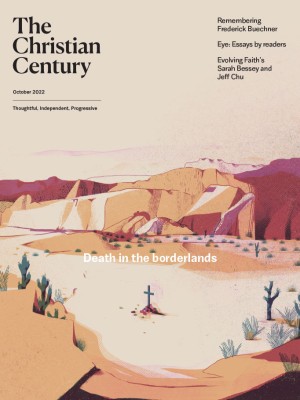October 2, Ordinary 27C (Lamentations 1:1–6)
These days it seems there are more and more opportunities for collective lament.
Lay leaders were gathered that evening for our monthly committee and council meeting. The committees had met in small groups, and now about 50 people were gathered for devotions and committee reports before the church council met. The young woman assigned to lead devotions that evening got up and began to read: “How lonely sits the city that was once full of people. How like a widow she has become, she that was great among the nations.”
She kept reading from Lamentations 1, which might have seemed like an odd choice for a council devotion—except that it was September 11, 2001. What felt odd was to be meeting as a church council on that evening, as if everything were normal, as if we were just going to plan Advent and Christmas worship or bake sales or Sunday school after watching two planes slam into the World Trade Center, after watching the buildings collapse, after watching a city fall.
Read our latest issue or browse back issues.
Lamentation was the only normal thing that happened that night.
But at the time, I was not that familiar with collective lament. It was not a part of my normal vocabulary. I thought lament was rare and mostly individual.
And then I listened to Lamentations 1 on the day the towers fell. I heard not individual sorrow but the sorrow of a people—of a nation—and I understood. Some things happen not to me but to us. To a nation, a city, a community.
It is hard to imagine the devastation Jerusalem experienced as it fell to the Babylonian Empire. Reading about it—the violence, the siege, the starvation, and the collapse of the city walls—calls to mind the siege of Stalingrad during World War II. There is unimaginable physical suffering but also the loss of a place, the loss of purpose, the loss of identity. Without Jerusalem, without Judah, who are the people?
Who are we? And who is God for us? The people of Jerusalem give voice to their sorrow, fear, anger, and loneliness. And for a moment after September 11 it seemed like we were allowing it as well. I was convinced that this experience would change us somehow, that after lamenting we would think of ourselves differently, that this experience would transform us as Americans.
I am not sure that happened.
I keep thinking about how Jeremiah spends much of his time preaching judgment—predicting just such an end for Jerusalem if they don’t turn back, return to God, and stop listening to false gods with false promises. So it is a surprise to turn to Lamentations, which is traditionally attributed to Jeremiah, and hear the sorrow and love with which the author speaks. The judgment is put aside for a time. Another truth is told, a truth that includes both horror and love. The truth is, Jeremiah loves Jerusalem. So does God. It is so hard to believe.
These days it seems there are more and more opportunities for collective lament. My denomination, the Evangelical Lutheran Church in America, even has a new worship supplement that includes three new liturgies for collective lament—over gun violence, over racism, and at the time of a violent event. I used a collective lament for the first time after the mass shooting at an elementary school in Uvalde, Texas. I did not get very much feedback after worship, except for two women who told me that they couldn’t stop crying.
That was not exactly what I was aiming for. I’m not sure what I was aiming for—except to tell a certain truth, in front of the community and God. It is easy in this conservative community to have a knee-jerk reaction to a subject like guns. (I heard one person say, “We can’t make enough laws to get rid of all of the evil in the world.”) Lament gets in between our defensive responses and just lets us name the pain and grief. It gives space to hear stories that are true, even if we don’t want to hear them.
To lament is to name the devastation, to hear the stories, without talking back. And then to lay it all before God and listen.





